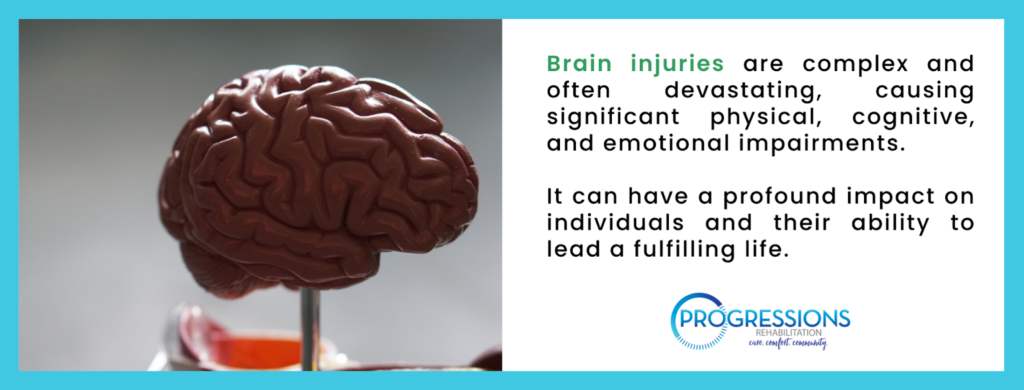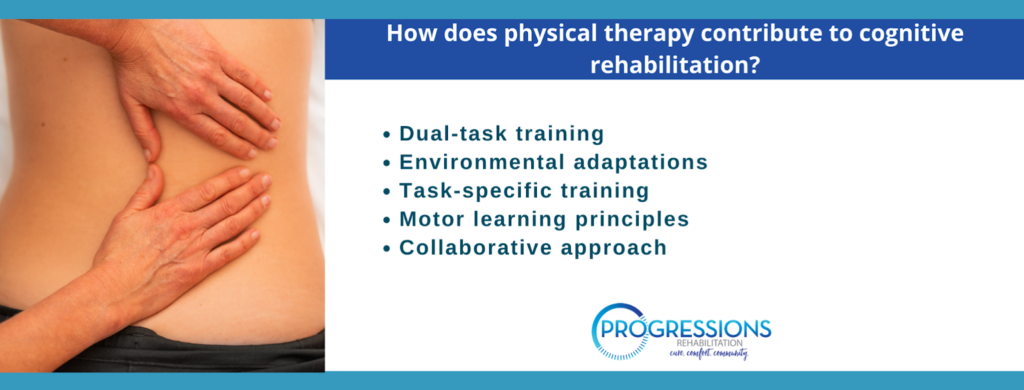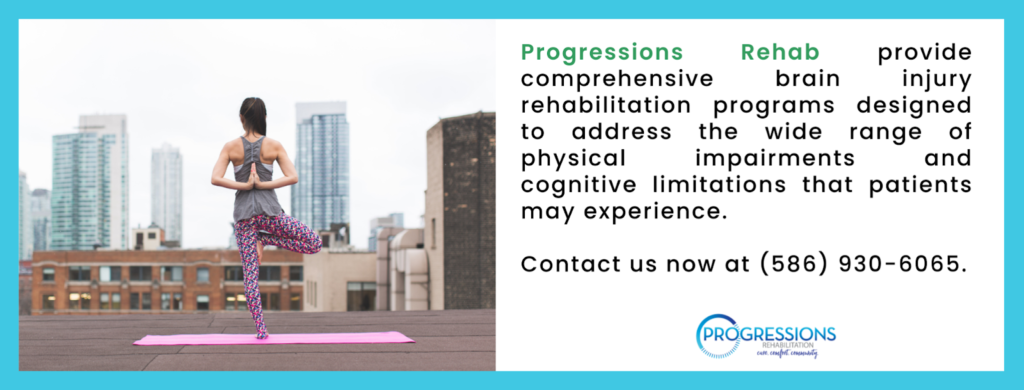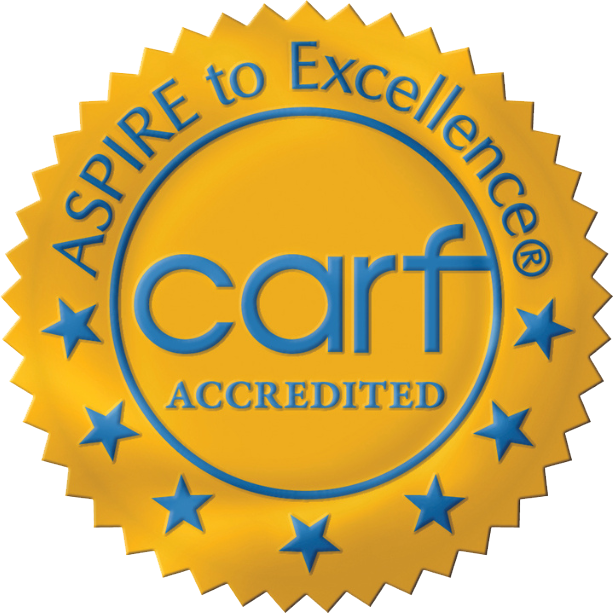At Progressions Rehab, our physical therapy program is prescribed independently by a physician but is exclusively available to our residential clients participating in our program. This program is designed to address the diverse needs of individuals facing brain injuries, spinal cord injuries, and stroke, alongside other services.
Our dedicated therapists work closely with patients, assessing specific challenges and tailoring customized treatment plans to restore physical functioning, improve mobility, and enhance overall quality of life.
How does TBI affect physical functioning?
Traumatic brain injury (TBI) can have a significant impact on an individual’s physical functioning. The specific effects will vary depending on the severity, location, and extent of the brain injury. Here are some of the most common effects of brain injury on one’s physical well-being:

- Balance and coordination
- Motor impairments
- Mobility limitations
- Sensory changes
- Fatigue and energy conservation
- Spinal cord injury
It’s important to note that the effects of TBI on physical functioning can vary widely depending on individual factors. Rehabilitation plays a crucial role in addressing these impairments and helping individuals regain functional independence to the greatest extent possible.
What is the role of physical therapy in treating brain injury?
Physical therapy plays a crucial role in the comprehensive treatment and rehabilitation of individuals with brain injuries. Here are some critical aspects of its benefits in brain injury treatment:
Restoring physical function
Physical therapists work closely with individuals with brain injuries to restore physical function and maximize independence. They assess the specific impairments caused by the brain injury, such as muscle weakness, balance deficits, coordination difficulties, and mobility limitations.
Based on these assessments, they develop individualized treatment plans to address these impairments through targeted exercises, therapeutic techniques, and interventions.
Enhancing mobility and balance
Physical therapy focuses on improving mobility and balance in individuals with brain injuries. They employ various strategies to help individuals regain the ability to walk, maintain balance, and move with increased confidence and stability. Some examples include:
- Gait training
- Strengthening exercises
- Coordination exercises
- Balance training.
Additionally, assistive devices, such as canes or walkers, may be recommended to support mobility during recovery.
Promoting motor skills and coordination
Brain injuries can disrupt motor skills and coordination. To address these challenges, physiotherapy utilizes therapeutic exercises, functional activities, and specialized techniques. Through repetitive and task-specific training, they help individuals improve their motor skills, coordination, and overall movement patterns.
Managing spasticity and muscle tone
Spasticity一characterized by muscle stiffness and involuntary contractions一is a common issue following brain injury. Physical therapy employs various techniques, such as stretching exercises, splinting, and modalities like electrical stimulation, to manage spasticity, reduce muscle tone, and improve range of motion.
Assistive devices and adaptive equipment
Physical therapists assist individuals in determining the need for and effectively using assistive devices and adaptive equipment. They provide guidance on selecting appropriate equipment, such as wheelchairs, orthotics, or mobility aids, and teach individuals how to use them correctly to enhance independence and functionality.
Incorporating cognitive and sensory integration
Physical therapists recognize the interplay between physical and cognitive functions. That’s why they integrate cognitive and sensory tasks into therapy sessions to promote cognitive rehabilitation and enhance sensory integration.
This approach helps individuals improve their ability to process information, make decisions, and perform tasks that require simultaneous cognitive and physical coordination.
Educating and empowering patients and caregivers
Physical therapists educate individuals and their caregivers about the nature of brain injury, its impact on physical functioning, and the goals and strategies of physiotherapy. They provide guidance on exercises, home modifications, and safety precautions to support continued progress and independence beyond therapy sessions.
Our physical therapy services are not offered as standalone services; instead, they are independently prescribed by a physician exclusively for OUR residential clients living within our program. Our goal is to promote recovery and restore functionality. This, in turn, improves the overall quality of life for individuals with brain injuries, strokes and spine cord injuries.

What are the different techniques used in physical therapy for patients with TBI?
Physical therapy for patients with Traumatic Brain Injury (TBI) utilizes various techniques and interventions tailored to the individual’s specific impairments and rehabilitation goals. Here are some common techniques for TBI patients:
Therapeutic exercises
Therapeutic exercises are a fundamental component of rehabilitation for TBI patients. These exercises focus on the following:
- Strengthening weak muscles
- Improving range of motion
- Enhanced cardiovascular fitness
- Better bone density and overall bone health
- Stimulates neuroplasticity
- Enhancing overall physical functioning.
Therapists may use resistance training, stretching, and balance exercises to target specific muscle groups and address impairments.
Gait training
Gait training aims to improve walking ability and restore a normal gait pattern. Physical therapists work with TBI patients to enhance their balance, coordination, and walking efficiency. They may utilize exercises that focus on weight shifting, step initiation, step length, and proper heel-to-toe walking.
Balance and coordination exercises
Balance and coordination exercises are crucial for individuals with TBI who may experience difficulties maintaining balance and coordinating movements. These exercises help improve postural stability, dynamic balance, and coordination of muscle groups. They may include activities like standing on one leg, tandem walking, or balance board exercises.
Functional electrical stimulation (FES)
FES involves the application of low-level electrical currents to stimulate specific muscles or muscle groups. It can help address muscle weakness, improve muscle control, and facilitate functional movements. FES may be used to support walking, improve muscle activation, and enhance motor control in TBI patients.
Assistive devices and adaptive equipment
Physical therapists assess the need for and provide guidance on using assistive devices and adaptive equipment. These tools may include canes, walkers, orthotics, or specialized mobility aids that support individuals with TBI in their mobility and functional tasks.
Vestibular rehabilitation
Physical therapists may utilise vestibular rehabilitation techniques if TBI has resulted in vestibular system dysfunction. These techniques involve specific exercises and maneuvers designed to address vertigo, dizziness, and problems with balance and spatial orientation caused by vestibular impairments.
Proprioceptive neuromuscular facilitation (PNF)
PNF techniques involve a combination of stretching, resistance, and movement patterns to improve muscle strength, flexibility, and coordination. PNF techniques can effectively improve functional movements and motor control in individuals with TBI.
Cognitive motor integration
Physiotherapy may integrate cognitive tasks with motor activities to enhance cognitive-motor integration. This can involve dual-task training, where individuals simultaneously perform physical and cognitive tasks, promoting multitasking abilities and cognitive engagement during functional movements.
It’s important to note that the specific techniques used in rehabilitative therapy for TBI patients will vary depending on the individual’s unique needs, impairments, and stage of recovery. Physical therapists tailor their interventions to address specific goals and support the individual.

At Progressions Rehab, we recognize the diverse needs of individuals facing brain injuries, spinal cord injuries, and stroke. That’s why we offer comprehensive rehabilitation programs designed to address a wide range of physical impairments and cognitive limitations that patients may experience.
Our dedicated therapists work closely with TBI, spinal cord injury, and stroke patients to assess their specific challenges, tailoring customized treatment plans to restore physical functioning, improve mobility, and enhance overall quality of life
Does physical therapy contribute to cognitive rehabilitation?
Physical therapy can contribute to cognitive rehabilitation in individuals with brain injuries. While it primarily addresses physical impairments and promotes functional mobility, it also recognizes the interplay between physical and cognitive functions.
Here’s how physical rehabilitation contributes to cognitive rehabilitation:
Dual-task training
This involves combining physical exercises or activities with cognitive tasks, such as problem-solving, memory recall, or attentional tasks.
Environmental adaptations
Physiotherapy programs involve assessments of the individual’s physical environment so as to make recommendations for adaptations that promote cognitive rehabilitation.
This may involve organizing the environment to minimize distractions, optimizing lighting conditions, and ensuring that safety measures are in place.
Task-specific training
Rehabilitation often involves task-specific training, focusing on practicing functional activities requiring physical and cognitive engagement. This integration of physical and cognitive demands helps improve attention, concentration, and cognitive processing during functional tasks.
Motor learning principles
These principles involve repetitive practice, feedback, and task progression. By incorporating these principles into therapy sessions, individuals can improve their cognitive abilities, such as attention, memory, and problem-solving, while also enhancing their motor skills and movement patterns.
Collaborative approach
Physical therapists work closely with other rehabilitation professionals, including occupational therapists and speech-language pathologists, who specialize in cognitive rehabilitation. They collaborate to ensure that cognitive goals and interventions are integrated into the overall treatment plan.
Progressions Rehabilitation – Providing Specialized and Effective Physical Therapy for TBI and Stroke Patients
Choosing the right provider is paramount when it comes to physical therapy for patients with brain injuries and other conditions. If you’re seeking exceptional care, personalized treatment plans, and a dedicated team of experts, look no further than Progressions Rehab.
We are committed to providing comprehensive care throughout your or your loved one recovery process. From the initial evaluation to ongoing therapy sessions and beyond, our team offers a continuum of care to support your progress and facilitate long-term success.
We believe in building lasting relationships with our patients, guiding them at every step towards achieving their goals. With our unwavering commitment to optimal recovery, we stand out as a leading provider of rehabilitation for patients with brain injuries, spinal cord injuries and stroke.
Some of the programs we offer include:
- Group homes for brain injury patients
- Group homes for spinal cord injury
- Traumatic brain injury rehabilitation

The material contained on this site is for informational purposes only and DOES NOT CONSTITUTE THE PROVIDING OF MEDICAL ADVICE, and is not intended to be a substitute for independent professional medical judgment, advice, diagnosis, or treatment. Always seek the advice of your physician or other qualified healthcare providers with any questions or concerns you may have regarding your health.



